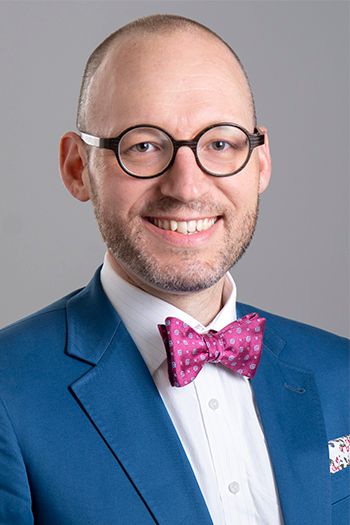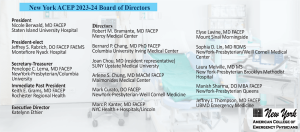I was knuckle deep, digging and tugging as determinedly yet gently as possible to loosen, fragment and ultimately extract the hard rock of stool the elderly gentleman, Mr. H, had been unable to evacuate over the preceding week. Although the lidocaine gel had provided some degree of relief, the poor man was clearly uncomfortable. I was uncomfortable. The nurse was uncomfortable. Nobody in that room wanted to be involved in this event, but after a week of laxatives and two failed enemas in the Emergency Department (ED), it was apparent the only way for Mr. H to experience relief was manual disimpaction. Multiple packets of lube, numerous pairs of gloves (always double – you only make that mistake once) and twenty minutes later, we had removed what we could and he was able to fully relieve himself. I saw another patient or two then went back to check on him. He smiled at me and said, “Thanks Doc. You really helped me out. I appreciate it.”
PRESIDENT'S MESSAGE
New York American College of Emergency Physicians
Sometimes Gratitude is a Buried Treasure
There is nothing glamorous or dignified about a fecal disimpaction. There is no great skill, no critical thinking and no heroic measures. It is uncomfortable for everyone involved, it smells bad and it takes up a lot of valuable time. Nobody likes it. Yet it makes a big difference in the life of patients such as Mr. H and so many like him. His sense of gratitude, in spite of the pain and discomfort he had just had to endure, was genuine and heartfelt. I hadn’t saved his life, nor had I really improved his health in any significant way. I had simply got down and dirty and helped him feel better.
We all live for the STEMIs, strokes, traumas and other challenging cases that make our work fun. We like to use our brains, make diagnoses, treat critical illness and feel like the healthcare heroes we are sometimes called. We often forget, though, we are as much of a hero to an elderly man with fecal impaction who just wants some relief as we are to the septic patient we resuscitate. Although I would have preferred to avoid having to disimpact Mr. H, it was quite gratifying to receive his heartfelt appreciation as he was leaving the department. It was also satisfying to be able to actually “fix” him. It made me feel good about myself and my job, even if it wasn’t a crucial save or a great catch.
I write this to encourage all of you (and to remind myself) to find joy and fulfillment in the mundane aspects of our work. No one enters our specialty looking forward to managing patients with chronic pain or fecal impaction, but it is a part of our job, and providing the same care and compassion to these patients as we do to our critically ill patients not only makes a difference in their lives, it may help save ours. In a field of medicine prone to burnout, cynicism, and substance abuse, we need the smiles and thanks of the Mr. Hs to remind us of how we make a positive difference in people’s lives. A good fecal disimpaction is definitely not the key to emergency physician wellness (wouldn’t that make for an interesting workshop at a national conference!), but if we are willing, we can look for and find satisfaction in our jobs where we least expect it.






